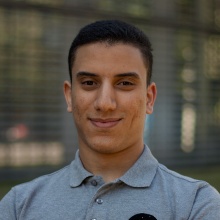Foreign students enrich the University of Stuttgart, both culturally and academically. To honor this, the Deutsche Akademische Austauschdienst (DAAD) annually funds a prize to be awarded to an outstanding foreign student.
This year, the International Office selected Abdelwaheb El Houimel.
The award winner from Tunisia is studying aerospace engineering at the University of Stuttgart. In addition to his professional qualifications, he received the award primarily because of his extensive commitment to social projects. He is a member of an interdisciplinary team at the School for Talents and is also on the board of the Future Visions Association, which is dedicated to educating and supporting young people in Tunisia in various aspects of life.
This year, the DAAD Award will be presented on the Day of Teaching and Learning, November 30, 2022.
In this interview, Abdelwaheb El Houimel tells us what experiences moved him to become involved at the University of Stuttgart and volunteer with an association:
Why did you choose the aerospace engineering study program?
In my home country, as in many other cultures, rocket science and aerospace are considered highly complex and hard-to-access fields of science that only the elite can learn. This has given aerospace a very prestigious status in our society as well as a certain mysterious aura. This aura has always interested me. When I found out that there are no aerospace engineering courses at Tunisian state universities and that the only way into this field was through the military academies, I was initially disillusioned. But then, after I was selected for the Tunisian scholarship program, and I came across a blog post on the Internet that listed various universities in Germany and their engineering programs. I stumbled upon the University of Stuttgart and saw that it was renowned for its aerospace engineering programs. Of course, it didn't take me long to decide what I wanted to do and what I was going to major in.
What is the biggest difference between where you were born in Tunisia and Stuttgart?
I grew up in the town of M'saken, in the state of Sousse in northeastern Tunisia. There, it is different from Stuttgart in every respect. I always thought life in Sousse was fast-paced until I came here. In Stuttgart and Germany in general, you're always in a race against time. Nevertheless, I find life here easier, or at least more manageable. In Tunisia, there is never one unchanging way to do anything. People have to keep finding different, new ways to do their jobs. It's like a never-ending chess game where the rules change with every move. The future is always uncertain. There is little that can be taken for granted.
You participated in the annual School for Talents program and were part of an interdisciplinary team. Which project did you implement? And what was special about this collaboration?
I was part of the "Learning Spaces" group, a five-person team that spent an entire year working to improve the student learning experience at our university. We developed new ideas, for example a new, user-friendly reservation system for study spaces. The work was interesting, and sometimes frustrating, but it was worth it. The best part of the job for me was engaging with a lot of potential "stakeholders" to get them on board to make our ideas a reality. The ability to develop a network is an important skill for the success of any idea, so it was exciting to do this myself, with the help of my team.
Why are you involved in the "Future Visions Association"?
There are several reasons for my commitment to this association: First, it is about the cause or vision we are trying to achieve, which is to build a society of socially, politically, and economically aware and active young people. Young people who can take matters into their own hands and determine Tunisia's future. Remember the "chaotic chess game" I described earlier? We believe that Tunisia has developed in this way because people are not aware of the changes that are happening around them and, above all, of the cause-and-effect relationships related to these changes. Instead, conspiracy theories and a subtle belief in universal randomness, a randomness that can neither be explained nor comprehended, are used as justification. Some of us call this "Mahmouta".
Another reason for my involvement is my perception that the manageability of life in Germany is so alluring that once immersed in it, people find it very difficult to accept or coexist with the somewhat more chaotic lifestyle in Tunisia. As a result, they leave Tunisia again as soon as they encounter the slightest obstacles. I feel like if I let that happen, I could end up the same way. That is why I am involved in volunteer work in Tunisia. That's how I keep up with this way of doing things "à la tunisienne."
What tip do you have for people who want to study and volunteer?
I don't think I have enough experience to give people advice on their volunteering work. My involvement in the Future Visions Association has to do with my desire to transform a vision into reality. When you have implemented a vision through your volunteer work in a group, what is "new" then becomes a matter of course for everyone.


